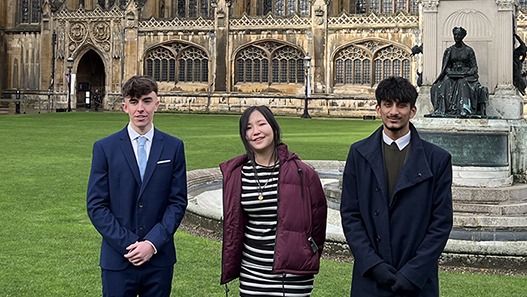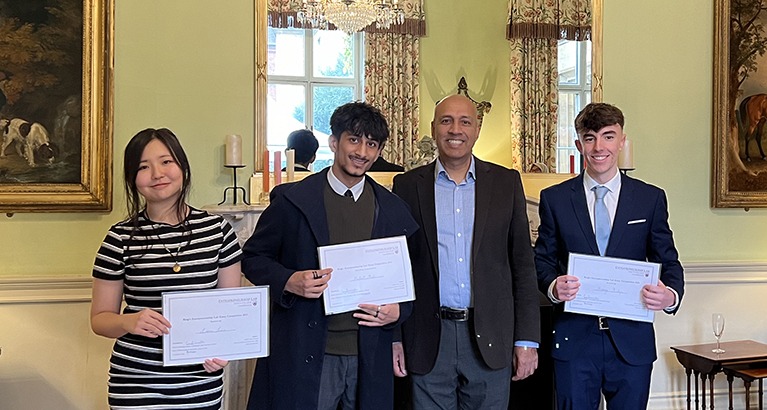Khaleel Miah, a student at Sir John Lawes School in Harpenden, Hertfordshire, won the inaugural King’s Entrepreneurship Lab (E-Lab) Essay Competition for secondary school students with an essay on how to learn from failures that drew on how musician Shawn “Jay-Z” Carter produced his own music after being rejected by other producers.
Runners-up in the competition were Leona Liu of Hills Road Sixth Form College in Cambridge, for an essay about ethical businesses and the trade-off between being profitable and having low prices to enable purchases by all income groups, and Harry Ridge of Coleg Cambria in Deeside, Flintshire, Wales, for an essay on how generative artificial intelligence has improved the efficiency of entrepreneurs.
Cambridge Judge connections to the competition

The 2023 competition has several connections to Cambridge Judge Business School: it was organised by Rhys Williams, a PhD student at Cambridge Judge; the King’s E-Lab is directed by 2 Cambridge Judge faculty members, Associate Professor in Economics & Policy Kamiar Mohaddes and Professor of Organisational Sociology & Leadership Thomas Roulet; and the awards were presented at a 9 December ceremony at King’s College by Gishan Dissanaike, Interim Dean of Cambridge Judge.
Judges of the competition were:
- Mervyn King, former Governor of the Bank of England
- Deborah Meaden, an entrepreneur known from the popular Dragon’s Den television series
- Gillian Tett, Provost of King’s College and columnist at the Financial Times
The winner and his school shared a £1,000 cash prize, and the two runners-up and their schools each share a £500 prize. The school portion of the prize is issued in the form of book tokens.
Students could write about ethics, learning from failure or AI
Students in Year 12 and 13 (and the equivalent in Scotland and Northern Ireland) were asked to choose one of 3 questions in writing a 1,000-word essay:
- Many businesses advertise themselves as ethical and sell environmentally friendly or ethically sourced goods. However, they often do this at a premium price. To some extent this is due to the higher price of their inputs but often they also enjoy a higher profit. To what extent is it ethical for a business to have excess profits from selling ethical goods?
- Why is learning from failure sometimes more effective than learning from success? Build upon examples of entrepreneurs (in the broad sense of the term) who were able to learn from failure.
- Generative AI technology, built upon Large Language Models, such as ChatGPT has allowed entrepreneurs to operate more efficiently. Discuss the impact of this technology for entrepreneurs and provide examples of how it is being used.
We are keen to foster this entrepreneurial spirit among students who might not traditionally consider entering the world of business.
“The purpose of the competition is to encourage UK Sixth Form students to pursue entrepreneurial aspirations and understand better how to launch an enterprise. We are particularly keen to foster this entrepreneurial spirit among students who might not traditionally consider entering the world of business and further hope this competition encourages more young people, who might not think about it, to apply to Oxbridge and Higher Education,” says the competition website.
Featured academics
Gishan Dissanaike
Interim Dean of Cambridge Judge Business School
Kamiar Mohaddes
Associate Professor in Economics & Policy
Thomas Roulet
Professor of Organisational Sociology & Leadership


